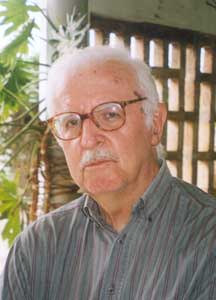Daniel Comboni
Comboni Missionaries
Institutional area
Other links
Newsletter
In Pace Christi
Capra Vincenzo
Fr. Vincenzo Capra was born in Alba (CN) on 3 October 1932. Ordained a priest on 31 May 1958, he left for Mozambique in 1962 and remained there until December 2004. Because of his deteriorating health situation (he had Parkinson for several years) and a case of malaria not properly treated, he was flown to Verona, Italy, with the valuable assistance of the Comboni Sister Elizabeth Raule, MD. In the following days he developed pneumonia and died at the hospital of Negrar, Verona, on 23 December. The funeral was held on 27 December in the presence of many confreres, some of whom from Mozambique. The body was then taken to Alba, his hometown, for burial.
Fr. Vincenzo had begun his missionary service in Lunga, as pastoral associate to Fr. Giovanni Zani. A considerable number of people gravitated around the mission and in 1963 there were already 50 weddings.
On 3 May 1966, by a decree of the bishop of Nampula, the new mission of Alua, detached from the old mission of Mirrote, was entrusted to the care of Fr. Vincenzo. The mission had over 850 students and a notable number of religious activities.
On 1 January 1971, the new mission of Namapa was officially detached from Alua and Fr. Vincenzo moved there on October 1971, together with three Third Order Carmelites of the Sacred Heart Sisters.
In 1974 Fr. Vincenzo was a member of the commission that had gathered in Carapira to prepare the text of the Conscience Imperative. He then actively contributed to the preparation of the final text that was destined to have a great impact on the work of the Comboni Missionaries in Mozambique.
On 11 April 1974, Holy Thursday, Fr. Vincenzo was called to Carapira together with other four Comboni Missionaries, and from there he was expelled from Mozambique because of the document he had helped produce. The missionaries were moved to Inhambane, then to Lourenco Marques (Maputo) and finally flown Lisbon on 13 April.
After the independence of Mozambique, with the establishment of a Marxist-Leninist regime and vast nationalisation, some missionaries entered the field of education. Fr. Vincenzo was one of them. He always remembered the experience as an enthusiastic time, because of the positive interaction with school age young people. He was praised by the government more than once because of his dedication to his work.
In December 1975 the bishop asked him to move to Iapala to help that mission that had been left almost without priests. Fr. Vincenzo worked with enthusiasm with the small Christian communities, taught in the secondary school of Ribáuè, the district capital, and in the middle school of Iapala.
During the last months of 1996 he was appointed as formator of the Comboni postulancy of Matola. He also taught at the philosophy seminary of “S. Agostinho” and helped with spiritual direction.
In May 2003, after a longer holiday stay in Italy, he was asked to go to the mission of Alua and take care of the activities of the diocesan Marian shrine of “Maria, Mãe da África,” a service to which he gave himself with faith and enthusiasm up to just a few weeks before his death.
On the day of his death, Fr. Francesco Antonini wrote from Italy: “A great missionary has left us, one who deeply loved the people of Mozambique and the Comboni Institute. He was always active, dynamic and positive. He was a missionary who left a mark in the history of the Comboni presence in Mozambique. He will remain as a blessing for the people and for us.”
Da Mccj Bulletin n. 226 suppl. In Memoriam, aprile 2005, pp. 71-82

